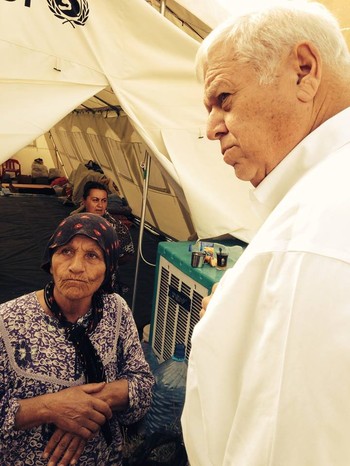The Presbyterian Church (U.S.A.) delegation to the Middle East, led by General Assembly Moderator Heath Rada, has turned its attention to Iraq, the second stop on the delegation’s three-week visit. The group spent three days meeting with church leaders, Kurdistan officials, and displaced families.
Each group that the delegation met with said they feared that the worst was yet to come for the thousands of refugees crowded into churches, schools, and tents as a result of the recent ISIS attacks.
The Middle East visit was planned in response to Overture 11-02 passed at the 221st General Assembly (2014). It directs attention to the church “that is suffering due to sectarian violence and persecution” in the Middle East. It also calls on the PC(USA) to be a catalyst in calling all Christians to unite in support and prayer for Christians that are suffering.
Rada is accompanied by Sara Lisherness, director of the church’s Compassion, Peace, and Justice ministry; Gregory Allen-Pickett, general manager of the PC(USA) World Mission program; and Amgad Beblawi, the church’s area coordinator for the Middle East, Central Asia, and Europe.
Ministers and elders of the National Evangelical Presbyterian Church of Iraq have hosted the group. Working with PC(USA) mission co-workers, the Iraqi Christian team met the delegation in Erbil and arranged transportation to various meetings in the region. The Iraqi Christian team also moderated some of the meetings.
The group initially met with Bashar M. Warda, archbishop of the Chaldean Catholic Church; Metropolitan Nicodemus Daoud Matti Sharaf of the Syriac Orthodox Church; and leaders of the International Bible Society in Erbil. Each expressed frustration that regional and world leaders had not responded more quickly to support the people in crisis. They were also clear about their distrust of government officials, both local and foreign.
“Thousands of people have been forced from their homes and jobs to live in tents or worse,” said Sharaf. “But these are strong people. They’ve given up everything for Christ.”
Sharaf himself was forced to leave his office and cathedral in Mosul and now works through a temporary office in Erbil. He reported that the cathedral has been converted to a mosque after militants removed all Christian symbols.
The group also visited a church refugee camp in the heart of Erbil and heard moving stories of faith in the midst of pain and suffering.
“In all of our visits, one common theme continues to come up in conversation: the approaching winter and lack of goods and services to see the families through,” said Lisherness. “I can honestly say that I was not prepared for what I’ve seen. We’ve met families who had to leave their homes and jobs, everything but the clothes on their backs, and even that won’t be enough when the winter comes.”
The team traveled south to Kirkuk, stopping at checkpoints and taking detours around war-damaged roads. 13 families living in small rooms on church property greeted them at church gates. Adults cried and shared photos of homes and families, while children gathered around to meet the visitors and to shake their hands.
“We spent hours meeting with them, hearing their stories. A Catholic priest, a refugee himself from Mosul, told of how Christians were forced to flee because of their faith,” said Allen-Pickett. “We also toured a preschool and kindergarten run by the Kirkuk Presbyterian Church — an incredible witness and outreach to the surrounding community, especially since 90 percent of their students are Muslim.”
The priest, Faris Tamas, said the churches in Kirkuk were not prepared for the large numbers of families seeking refuge.
“Resources are at a bare minimum, and that’s the case at all churches,” he said. “Winter is coming, and we are not ready. Several young women in our midst are preparing for childbirth. It has only been a couple of months, and we are completely worn out.”
The families gathered with Rada and the team in the church sanctuary, where he shared PC(USA) concern and prayers. He also spoke directly to the children and gave each a small gift before joining with the entire group in prayer and song.
“It touched our hearts to see these children and their parents smile, even for a brief time,” Rada said. “We could feel God’s holy presence as we shared their pain and suffering.”
In 2003, there were an estimated 1.8 million Christians in Iraq. According to government officials, that number dropped to approximately 600,000 in 2010. Since ISIS began its violent campaign across Syria and Iraq, another 200,000 have left the region.
Speaking about U.S. involvement in Iraq, an Iraqi Presbyterian leader said on condition of anonymity, “Since the military invasion in 2003, the U.S. has lost credibility in the region. We know that the U.S. airstrikes are not to protect the minorities in the Middle East, but for America’s own interests.”
After a time of prayer and reflection with the Christian leaders in Iraq, Rada pledged to spread the word about the crisis to congregations in the United States. As Rada and the team began the next leg of their visit, he said he was reminded once again why he was there.
“I was listening to a little girl no more than four years old singing a song, and it touched my heart,” Rada said. “She sang, ‘I love my family, and no one can take my faith from me.’ That speaks volumes.”

